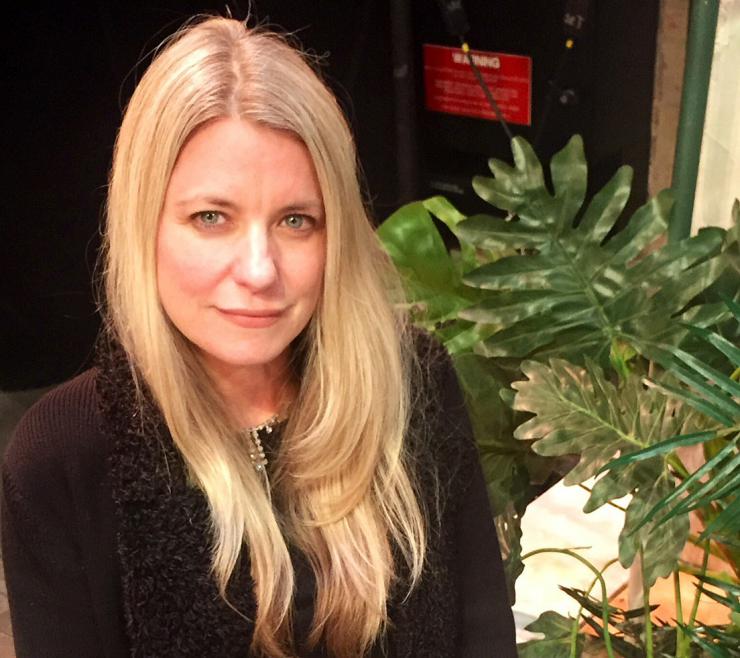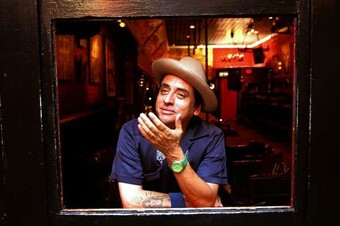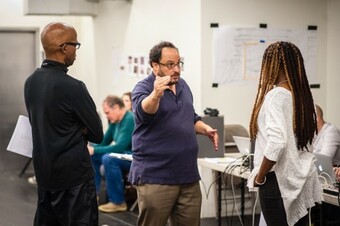Interview with Aimée Hayes
Anthony Werner: Here we are, towards the end of the Convening, and we’re curious about what have you heard that you can’t stop thinking about?
Aimée Hayes: There are two things I can’t stop thinking about. The first thing, well, Rocco Landesman’s talk with Diane Ragsdale, but I think we’ll get to that. The other thing was that someone shared that Joe Hodge has this house in North Carolina, apparently, that artists can visit, and he just says, “Come on down, the house is empty.” So you can come for a month, or a week, or whatever, and work and do what you need to do. What that has triggered for me is, in New Orleans, we have a real lack of resources in terms of space and rehearsal rooms and everybody has to work outside jobs. Nobody’s a full-time anything; everybody’s a part-time everything. It has gotten me thinking what else can Southern Rep do? What else do I need to do? How open can you be? Can you be too open? How can we make a difference? So it’s a conversation we’re having in New Orleans and it was exciting to be here and hear about that.
The other thing that has stuck with me, Lisa Adler talked about audiences in Atlanta in our diversity conversations, and Atlanta is by majority an African American city. She said, “We just started doing work with that majority in mind and our audiences shifted to people interested in good work, and we’re getting more diverse audiences now.” I think something I also see in New Orleans is: why are we doing the work that we’re doing? Who are we really talking to? As Rocco suggests, our audiences are dwindling according to the NEA survey, but God knows how they got the statistics—can we find that out? Can somebody please do a report on that because I have board members who show it to me and say “See, see, we need to cut back everything because our audience is dwindling.” But who are those people that they talk to? That’s a tangent, but anyway. So those two things: thinking about what we can give back to the artistic community and also, who is my audience? And I think there’s maybe a lot I don’t know about my audience in New Orleans.
Anthony: The title of this convening is “From Scarcity to Abundance,” so from your perspective, is the field and the new play sector in a period of scarcity or abundance?
Aimée: I think we have to go back to Todd London’s update. It was a litany of there’s this program, there’s this money, there’s that grant, there’s that award. I think the scarcity issue is being addressed. To me it seems like an awful lot is out there. There are workshops, development opportunities, and there are also more playwrights, so it’s never going to be enough. I think if you look at biology, if you look at how animals proliferate, if there’s enough food, they’ll be more and if not, there will be fewer. And I think in some ways, Rocco is making that point. Since we have so much, since there are so many theaters and so many non-profits, there’s going to be a supply and demand issue, it’s basic economics.
Are you supplying the audience? Is there a demand for what you’re doing as a theater? And if you’re subsidized, you don’t really know. I think an interesting thing will be to see what happens in Europe, because they’re cutting back on subsidies. England cut their arts budget. So all of a sudden, you’ve thrown all of these non-profits out of the nest and it’s going to be survival of the fittest and we’ll get back to some social Darwinism for the arts over there. I think we should pay attention to that. I always feel like I don’t want my theater to run like a not-for-profit. I wish I could run it like a lean, mean business. And we think about that a lot at Southern Rep, because our audiences are shrinking. I think Rocco is addressing something that we may have to deal with if arts funding is cut more. Our funding was cut eighty percent this year, so I am thinking like him. I am thinking like, Yeah, I have to hustle. We have to think like a business. Eighty percent is huge.
I want to work with someone that wants to be involved. Let’s make this a success on all fronts, artistically, monetarily, in the community. I like artists that want to work in the community.

Anthony: So talking about artists, what can we learn from artists?
Aimée: I think that what we need to pay attention to from the artist is something I was talking about earlier in the roundtables. I think that some artists want very much to be involved in how to get their work out there. The playwrights that want to be involved have thought about this marketing thing. What if we talk about the play like this? That’s not the touchy feely stuff, that’s the “I want my name out there, because if it’s out there, that means that maybe someone else will pay attention and maybe I can get another production.” I want to work with someone that wants to be involved. Let’s make this a success on all fronts, artistically, monetarily, in the community. I like artists that want to work in the community. I like artists that want to be part of talkbacks and ask what else they can do for the city.
Anthony: There’s been a lot of talk about the future here—what’s your dream for theater in the next fifty years?
Aimée: Well, you know, it’s like a loaf of bread in everybody’s basket. I wish—one thing we talk about at Southern Rep—if we could just get each person in New Orleans to come to one damn play every year, just one play, that would be an amazing thing to have happen. That’s simple. Just see one play, each citizen out there in the United States of America, come see one play this year. We’ll entertain you, and some years you might not like what you see. You might be offended and write me letters. And some years, you may be so moved it will change your life in some small way. And some years you might just laugh and it’s a trifle and it’s sequins and glitter and it’s just something silly and fun. I don’t think that’s a bad goal. As for myself, I would like to have some wagon with some horses and a little gang and run around from city to city and do theater and I’ll play all the old lady roles.












Comments
The article is just the start of the conversation—we want to know what you think about this subject, too! HowlRound is a space for knowledge-sharing, and we welcome spirited, thoughtful, and on-topic dialogue. Find our full comments policy here